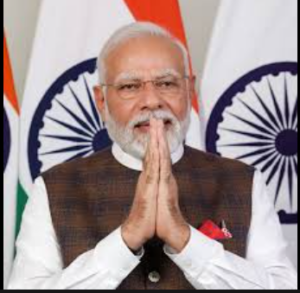Few people have had as much of an impact on the enormous field of international politics as India’s 14th prime minister, Narendra Modi. Modi has sparked praise and criticism in equal measure on the global scene because to his captivating personality and penchant for contentious initiatives. We go in-depth on the mysterious leader’s background, his policies, and his effects on India and other countries in this blog post.

Growing Power: Narendra Modi
Narendra Modi’s ascent to the pinnacles of power from a modest upbringing is quite amazing. Modi was born on September 17, 1950, in the small Gujarati hamlet of Vadnagar. His early life was characterized by difficulties and adversity. But he advanced because of his natural leadership abilities and steadfast resolve.
Early in the 1970s, Modi joined the Hindu nationalist Rashtriya Swayamsevak Sangh (RSS), which marked the beginning of his political career. His ascent through the Bharatiya Janata Party (BJP) ranks was rapid, and he swiftly rose to prominence there.
Duration of Modi’s Prime Ministership
Narendra Modi became India’s prime minister in May 2014 following a resounding win in the national elections. During his term, India’s socio-economic landscape has undergone significant transformation through the implementation of bold initiatives and ambitious reforms.
Important Initiatives and Policies
Demonetization:
The abrupt removal of high-value currency notes in 2016 was one of the most divisive decisions made by the Modi administration. Although applauded as a daring move to combat corruption and dark money, it was criticized for having a negative effect on the economy.
GST (Goods and Services Tax):
Since India’s independence, the GST has been the largest tax reform, and Modi led its implementation. Its implementation had teething issues, despite its stated goals of streamlining the tax code and accelerating economic growth.
Swachh Bharat Abhiyan:
In order to eradicate open defecation in India by 2019, Modi introduced the Swachh Bharat Abhiyan (Clean India Mission) in 2014. Nationwide improvements in sanitation and hygiene have been made possible by the initiative.
Made in India:
Prime Minister Modi introduced the Made in India program as part of his goal to increase manufacturing and position India as a global center for manufacturing. The initiative seeks to promote innovation in important industries and draw in international investment.
Modi’s Worldwide Effect
Since Narendra Modi actively interacts with the world community on a number of fronts, his influence is felt much beyond the boundaries of India.
Foreign Policy:
In an effort to bolster India’s strategic alliances and increase its visibility internationally, Modi has undertaken an assertive foreign policy. His “Neighborhood First” approach seeks to balance connections with major powers while promoting stronger ties with nearby nations.
Climate Change:
Under Modi’s leadership, India has ratified the Paris Agreement and launched programs like the International Solar Alliance as part of its considerable commitments to combating climate change.
Diplomatic Outreach:
India’s relations with nations in Asia, Africa, Europe, and the Americas have been strengthened by Modi’s numerous international travels and diplomatic outreach, which has improved economic cooperation and strategic alliances.
Reactions and Disputations
Narendra Modi’s reign has been tainted by criticism and controversy despite his popularity. His detractors charge him with inciting religious intolerance, quashing criticism, and adopting policies that sow division and threaten India’s secular fabric.
In summary
India’s political environment has surely been irrevocably altered by Narendra Modi’s leadership. The nation’s socioeconomic trajectory has changed as a result of his bold reforms and initiatives, which have drawn both admiration and condemnation. The globe keeps a careful eye on Modi as he continues to negotiate the challenges of government, fascinated by the lasting impact of one of the most significant leaders of our time.